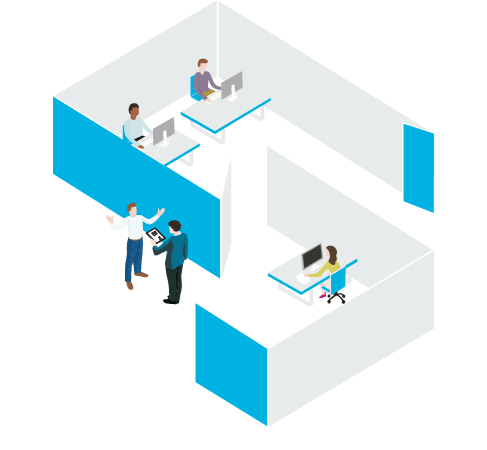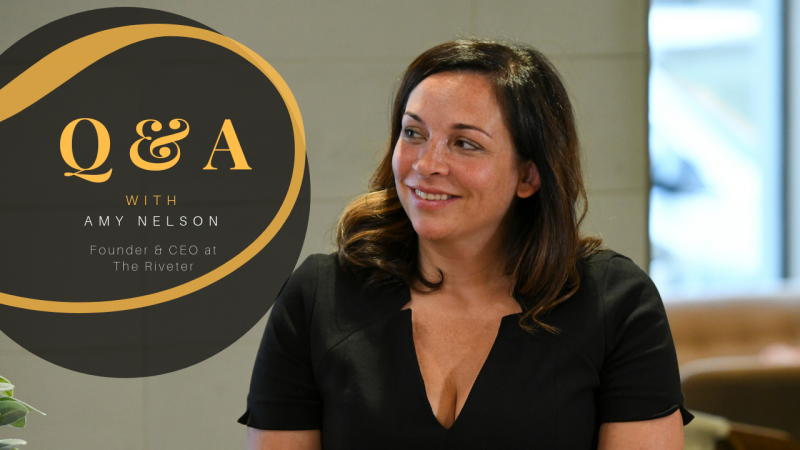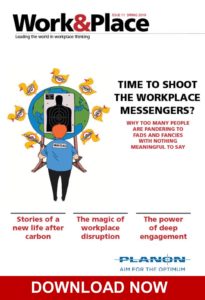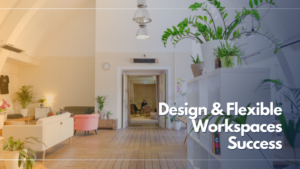How the Riveter is Outpacing Workspace Giants: a Q&A with Founder and CEO Amy Nelson
Published on September 13, 2018 – By Cat Johnson
In 2017 Amy Nelson opened the doors of the first Riveter location in Seattle. A shared workspace built “by women, for everyone,” the Riveter is on an impressive growth trajectory as the company prepares to open its fifth space.
Allwork.Space spoke with founder and CEO Nelson about the Riveter’s rapid growth and impact, the importance of having places to have hard,yet, mportant conversations, and why the Riveter is not a niche coworking space.
Allwork.space: Not long ago, there was Riveter Seattle, and Riveter LA. Now, I’m seeing big moves and all kinds of activity from the Riveter. What’s the latest for you and the Riveter team?
Amy Nelson: The Riveter launched in May of 2017 with a space in the Capitol Hill area of Seattle. Now, 16 months later, we’re about to open our fifth space, so we’ll have over 75,000 square feet of coworking space. The pace of our growth means we’re outpacing both WeWork and Industrious’ early years, which is really exciting to us. It shows that there’s an incredible opportunity for women to have a voice in the leadership of the future of work. We’re really proud of the community we’ve built.
Allwork.space: How have things changed for you personally since the first Capitol Hill location?
It’s been an exciting and hard journey. I compounded all of it because I had my third daughter in August of 2017, so I made it just as about as difficult as I could. This outpaces any dream we had about our expansion, but this is a great problem to have. The way the Riveter’s mission and our workspaces have resonated with people is powerful.
We’re at a really interesting moment in time in American history. The ground is shifting under us every day; we’re having conversations that we’ve never had before that are incredibly important, and the Riveter has become a place where those conversations happen. And they happen, not just among women, but with men and other genders. The Riveter membership is over 20 percent male. It’s a place where people can come together and work to change what tomorrow looks like.
Allwork.space: I see the Riveter really resonating with people for inclusiveness and diversity reasons. There’s also a professional level that’s really appealing. I get the sense that the Riveter encourages next-level careers in a very real way.
We’re really proud of our programming. When we started the Riveter, we made a conscious decision that we would be more than a workplace. We think there is so much room for a community and a platform to grow your business. Women have different hurdles than men in growing a business. I’m not a social scientist and I don’t know why, but I do know that women receive under three percent of venture capital dollars. And what’s more relevant to many businesses is that women only receive one in every 23 dollars of small business loans.
How do we move the needle on that? How do we provide a place where women can share their resources and share skills; connect each other to investors or loan officers; where they can talk about how they built their social media following. The Riveter has become a place for those things to happen.
We have our own programming that we curate and put on. We have venture capital firms come in, we do social media 101, and public speaking workshops. We just wrapped up the Good Guys Series that brought together dozens of male, corporate leaders to talk about how to be allies to women in the workplace. Things like that change people’s lives because we’re talking about hard subjects in a really supportive community and space.
Allwork.space: Was there an a-ha moment for you when you realized that your vision for the Riveter was going to be realized?
It was really the day we opened our doors in May of 2017. Without spending a single marketing dollar, we had over 100 members come through on day one, paying between $100 and $2,000. That meant that what we were doing was necessary and good and that we could bring it to more people.
Allwork.space: That’s a dream come true for new space operators to have 100 members on day one. How did you get the word out about the Riveter before you opened?
The thing about being built by women for everyone, is that we were able to partner with dozens of organizations throughout Seattle who are focused on amplifying women’s voices. We partnered with everyone from social justice organizations to women’s career platforms.
We’re not in the business of recreating the wheel, we’re in the business of helping move the wheel faster. We were able to partner with all those organizations and let them know we had a space where their amazing community could come to. They could meet other amazing women and do amazing things. That’s really how we grew it in the beginning.
Allwork.space: With the event programming, can non-members come into Riveter spaces? Do you invite people from the extended community in?
We made a conscious decision to be built on a model of inclusivity, not exclusivity, so we decided we would welcome people from the public. There are a lot of people who want to be part of what the Riveter is building but don’t need a workspace, so we want to be accessible to them with the programming and events. We want to welcome as many people as possible.
Allwork.space: What is the biggest challenge you’re facing right now?
Keeping up with the demand. We get messages every day asking us to bring the Riveter to Houston or Chicago, or asking when we’ll be in Omaha. It’s the question of where we go next and how we continue to build. And we’re building a corporate culture for the Riveter. We’re across the country, and learning to build a corporate culture within our own team. I’m a first-time founder and that’s something I think about every day.
Allwork.space: Do you have any favorite success stories that have come out of the Riveter?
We’ve seen female founders get their first investment checks in the Riveter; one of our members just received a $250,000 grant after leaving her corporate career. She told me the Riveter was critical to her success because when she left her job she was in a hard place and she was able to find a community here during a really hard transition. If we can do that for 10 people, we’ve done our job.
One of our tenants is a startup called Armoire and we’ve seen them triple in size as they’ve grown in our space. They came out of the accelerator at the Sloan School of Management at MIT.
I’m also really proud of the fact that we are a place for important and hard conversations. We just had the author of White Fragility give a talk on race in America. Those are hard conversations but they’re super important and we’re really glad to have them.
Allwork.space: I’d love to hear your thoughts on the emergence and sustainability of niche coworking spaces.
We don’t see ourselves as niche at all. We are growing faster than WeWork and Industrious did in their early days and we’re planning for, and building with, international expansion in mind. We think there’s more than enough room for major national and international players to continue to grow.
Industrious, WeWork, Knotel, RocketSpace, Convene, they’re all built by men for everyone—the Riveter is built by women for everyone. It’s really important that we recognize that there is room in the market for that kind of a platform.
Read Full Article from AllWork.Space https://ift.tt/2NaQLhN




